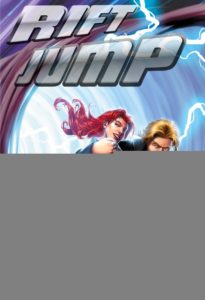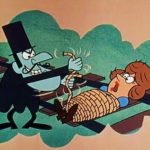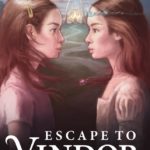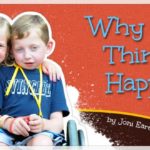Familiarity Versus Originality
 Lately I’ve been taking a break from writing. We just released my new book Rift Jump through Splashdown Darkwater (behold yon plug), and it was a mad race, all the way to the finish. My mind is totally spent, so I’m taking a small breather before I dive back into the countless other projects I’ve committed myself to. And, like I usually do when I take a break, I’ve been watching a lot of movies. Just old favorites that I haven’t watched in awhile. It’s a chance to give my brain a rest.
Lately I’ve been taking a break from writing. We just released my new book Rift Jump through Splashdown Darkwater (behold yon plug), and it was a mad race, all the way to the finish. My mind is totally spent, so I’m taking a small breather before I dive back into the countless other projects I’ve committed myself to. And, like I usually do when I take a break, I’ve been watching a lot of movies. Just old favorites that I haven’t watched in awhile. It’s a chance to give my brain a rest.
But, as a writer, your brain is never really resting. Even as I’m watching these movies that I’ve seen countless times, I’m still studying them. Trying to figure them out, to figure why I love them so much and how I might inject some of that awesome-sauce into my own writing.
As I’ve pondered these things, I’ve come up against a conundrum. I work as a screenwriter and a novelist, and in both fields you hear the charge: “Be original. Show me something I’ve never seen before.” But I’ve realized that, what people really desire is an original image or window dressing. At the heart of the story, I wonder if we all want the “same old thing.”
There’s a certain expectation that I think we bring into a story when we sit down to read a book or watch a movie. There’s a way we want it to play out—even before we know the story. We want the good guy to win. We want the bad guy to lose. We want the guy to get the girl (or vice versa). We want the guy everybody counted out to be the guy that saves the day. There are archetypes that we look for, common themes that we crave. I wonder, where does this come from? Is it cultural, or does it speak to a deeper human level? A spiritual yearning for justice, for evil to be punished, for good to triumph.
I remember when I first read the last part in Stephen King’s epic Dark Tower series. Spoiler alert if you’ve not read it, but the series chronicles Roland of Gilead as he hunts down the wicked Man in Black. For six books—and most of Roland’s life—he’s been trying to find this man, to kill him. But, in the very last book, Roland and the Man in Black never meet. They never face-off, never get their big battle. The Man in Black is eaten by some random spider creature, and Roland continues on his quest to the Dark Tower. A lot of fans were angered that Roland and the Man in Black never got to duke it out, but I really enjoyed it. It was a surprising twist, and it smacked of realism to me. I mean, seriously, how many times did we get to face down that school bully in some epic battle, only to emerge victorious and have the school cheer us on, right?
I recently turned in a script to a producer to get his thoughts, and he told me how the ending was unresolved, though I thought the ending was perfectly resolved: The bad guy escaped and the good guy died fighting him—but died a hero. The greater story wasn’t punishing the bad guy, but about proving your mettle, no matter the cost. To me, the story was told. But the producer felt it was unresolved. Why?
Perhaps because he was still waiting for the bad guy to be caught. For the good guy to win.
Are we biased? Do we really want stories to surprise us, or do we want A, B, and C?
I’m guilty of that, too. I watch a movie and I fall into a groove and there’s a way I think it should end. The familiar ending. And, when it doesn’t end like that, my first reaction is, “I didn’t like it.” Why? It was wonderfully written, well-acted, beautifully photographed—but it didn’t follow the beats that I wanted. It didn’t give me the same old thing.
Isn’t that strange?
I remember reading many years ago that It’s A Wonderful Life was met by its share of controversy back in the day, because the villain never received his comeuppance. Through deceit he ruins the life of poor George Bailey, and he’s never caught. But I think that anyone who has seen that movie knows that George really won. It wasn’t about catching the bad guy, but about living your life in spite of him.
Of course we wanted Han Solo to return at the last second to help Luke destroy the Death Star in 1977. Of course we wanted Harry to beat Voldemort. Of course we wanted Rocky to win, even when he lost.
Those old stories, as “typical” as they are, speak to a deeper longing in all of us. We want to know that good wins. That there is hope. That love is just around the corner. Life doesn’t always demonstrate that to us, so we find ourselves at Story’s door, wanting to escape to a place where magic is still alive. To fly in the face of that child-like expectation is almost a betrayal of Story.
Do we really want Frodo to make it to the edge of the volcano and NOT throw in the One Ring, but keep it and dominate the world? It would certainly be an ending that makes logical sense. It would also defy storytelling convention. But, for all of our demanding to see an original story, do we want that or do we want the familiar?
Did I betray the Story by writing a script that doesn’t end with a more traditional “resolution”? Why do stories need concrete resolution? Why do we want them? Life rarely resolves, so why must stories?
I’ve been rethinking my ending of the script in question. Not necessarily to give it a “happy ending.” I’m not saying that a story can’t have a bad/sad/tragic ending and work well, but I think that—when it’s done right—we still find something to celebrate. Or maybe we’re more willing to accept a sad ending when we can see it coming, when we can prepare ourselves.
Isn’t that a kind of familiarity, too?
So, as a writer, am I beholden to these tried and true paths? Do I really have any control over the story, or am I following some deeper instinct? How much originality will my audience, or any audience, really embrace? Maybe all I can change is the window dressing. Maybe that’s all anyone wants changed.
Maybe the best stories are the ones we all know by heart.
I leave it to you, as readers and/or storytellers: What were some stories that were NOT what you were expecting, that defied convention, and yet you still love them? Why? How might we break the mold of conventional storytelling, but still strike that instinctual chord in all of us? Can we?
– – – – –
Greg Mitchell is a screenwriter and novelist living in Northeast Arkansas and is the author of The Strange Man and Enemies of the Cross. His first produced screenplay, Amazing Love: The Story of Hosea, starring Sean Astin (The Lord of the Rings Trilogy), will release to DVD later this fall. Visit Greg at his web site.












































Hm…I don’t know what I expect from an ending, except that even if it’s sad, I want a sense that life will go on afterwards. This is easier to achieve with series, I suspect, but I still don’t want the sense that the story is the be-all-and-end-all. As for twists, I like them sometimes, but I also like the “I knew it!” moments.
offtopic: I won’t be on this site from August 4-25th. I’ll be working as summer staff at camp and this site is blocked by their filters:(
“I don’t know what I expect from an ending, except that even if it’s sad, I want a sense that life will go on afterwards.”
I think you touched on something great here. And, perhaps, that’s where I failed in my screenplay that I mentioned. Providing that sense that “Life is dark, now, but it’s going to be okay.” That’s something I’m trying to improve on, because the issue is, as the writer, I KNOW that my characters will live on. So I guess that flips my “happy trigger” and I leave the ending ambiguously bleak forgetting the fact that the audience isn’t in my head and they don’t know what I do about the characters’ future. :p
I’m trying to think of any books I liked that had sad endings. I can’t think of any. Sure, I can appreciate the story itself, like Peter Pan or The Princess and Curdie. But I also know where to stop reading.
Every book that has a sad ending where the hero dies or otherwise fails, I never read again. Because that’s real life. In real life, the hero seldom wins and evil appears to triumph. Sure, we know Jesus will come back someday and set everything right. But right now, with the hopelessness of our culture compounded by economic depression, I’d rather read a book with a happy ending. Because happy endings remind me that sad endings aren’t the norm.
I think you’re right about the window dressing, though. Give me new flashy window dressing! And make sure the hero wins. Do the archtype stuff in the background, but new fun stuff in the foreground. It’s like how every painting is built on a foundation of light and shadow. If you remove one of those, then you’ve departed from realism (my painting style of choice).
The only book I can think of that has a “sad” ending is Dogsbody by Diana Wynne Jones, where the star Sirius is tried for murder and his penalty is to live life as a dog on Earth until he can clear his name. The ending is what we wanted and expected all along–we knew he’d solve the mystery and be reinstated–but it comes with an unexpected price tag. So it’s bittersweet.
The flipside to that is in happy times, people crave tragedy. My sister went through this period where she was hooked on all those depressing Russian authors because she couldn’t get enough tragedy. Apparently she didn’t have enough in her personal life.
Me, I have enough angst in my own life, so I want happy endings. It depends on where a person is in their life.
Greg, thanks for your great thoughts.
From what comes this desire to re-enact familiar stories and elements? It comes from the first and truest Story, Scripture itself. People can redress and add Clever Twists and explore different emphases, but ultimately the basic structure must remain the same. Even corrupt humans crave that similarity. Otherwise we reject it by instinct.
Some weeks ago I also saw Rift Jump frequently referenced in Splashdown social-network circles. I must admit, the comic-style cover leaps (ha!) out to me and makes me wonder what the story is about. Already we have many Splashdown Books titles in the Speculative Faith Library, and it seems Rift Jump is the newest and hasn’t yet been added. If you like, here’s the submission form for new books. And any reviews, either original or previously published, can be submitted here for front-page promotion.
Thanks for the link to the submission form. I had meant to do that for Rift Jump, but, with it being so new, I didn’t have a review quote yet. But I just got one the other day, so I’ll be sure to submit it! 🙂
Stephen said: “From what comes this desire to re-enact familiar stories and elements? It comes from the first and truest Story, Scripture itself.”
On that note…
I always plot my stories with an excellent outlining technique I learned from a video seminar series (if you’re curious, Google “Dan Wells on Story Structure”; it’s on YouTube). The plot structure goes like this:
– Hook: where everything begins
– Plot Turn 1: the protagonist is driven to action by an event
– Pinch 1: pressure is applied; there is danger
– Midpoint: a turning point is reached; usually the protagonist moves from passive reaction to direct action against the antagonist
– Pinch 2: more danger; the protagonist seems to be in the “jaws of defeat”
– Plot Turn 2: the last piece falls into place
– Resolution/Climax: the point the story has been building to all along
One day while taking notes during a sermon, I realized that the story of redemption actually follows the same basic plot!
– Hook: God creates man.
– Plot Turn 1: Man falls into sin.
– Pinch 1: The world is full of sin and sorrow for generations.
– Midpoint: Christ comes to earth as a man.
– Pinch 2: Christ is crucified; it looks like Satan has the upper hand.
– Plot Turn 2: Christ is raised from the dead!
– Resolution: Christ is given dominion over all things as Savior and Lord, and ends the rule of Satan forever.
I outlined it on the side of my notes and sat there thinking, “No WONDER this is the best outline for a plot!” 😀
I’m a happy endings person, myself…I don’t mind things taking a sad or unexpected turn at the end if it makes a story stronger, but as a general rule I firmly believe stories should end happily. 🙂
Amen! And of course, God’s Story came first. We’ve all just been “imitating” it, or in some cases trying to be more clever or more spiritual than reality, all along.
This is what frustrates me about some Christians’ approaches to story. They act as if they need to come from some place outside the Bible, “salvage” Scripture truths and elements to “put into” a new story, and subconsciously divide the two. This is far from truth. All of Scripture is the basis of all stories underneath, not in bits from alongside.
The Lord of the Rings is great for this discussion, because I firmly believe that it doesn’t have a simple, stereotypical, good-always-wins ending. And yet, as said, it does indeed fit the epic pattern; Frodo is indeed a virtuous hero who overcomes.
(Spoiler alert if you don’t know how LOTR ends, as unlikely as that may be.) The story would have been deeply flawed, much less powerful and compelling, if the good guys lost or if Frodo gave in to temptation. However, I think the story would also be less powerful if the ending was completely and unambiguously happy. There is joy at the end, but joy veiled through tears at the final separation of the Fellowship at the Grey Havens. I just read and commented on the most recent Speculative Reading Group column about The Lion, the Witch, and the Wardrobe, and Mr. Burnett quoted Tolkien’s view of eucatastrophe — “…Resurrection was the greatest ‘eucatastrophe’ possible in the greatest Fairy Story — and produces that essential emotion: Christian joy which produces tears because it is so qualitatively so like sorrow, because it comes from those places where Joy and Sorrow are at one…” Critics who say that LOTR is all black-and-white with no moral complexity are naive. As Gandalf says in that last chapter, “I will not say: do not weep; for not all tears are evil.”
And to quote a certain Doctor: “Happy crying. Humany-wumany….”
Tears can come from joy as well as sorrow.
I don’t require happy endings to the stories I read or watch. I actually love Pirates of the Caribbean: At Worlds End, because of it’s ending. Spoiler
I never saw Will’s ‘death’ coming and was completely blindsided by it, but it fit because they had been hinting at it since the last movie. All the pieces slid into place, even as I cried for what Will and Elizabeth lost. I am okay with most endings, provided they’re led up to properly. Sometimes I feel like an author decides that the ending is to boring and suddenly flips the entire story upside down. Without proper lead in this feels abrupt and unnatural and often sacrifices the flow and feel of the story, leaving me feeling disjointed and out of place.
I have also noticed my tastes changing though as I get older and see more of the world. I begin to crave a happy ending. I was very upset by the end of the Hunger Games trilogy. That didn’t feel wrapped up. It felt depressing and unresolved. I wanted Katniss to triumph. After all that had been done to her I wanted her to win, not be broken by her enemies.
I guess what I really need at the end is hope. I need to be left with a promise that even if everything isn’t right now, it can be made right in the future.
It’s funny you mention At World’s End. I LOVED that movie and thought it was the perfect end to the trilogy. I was bummed at the ending…until I stayed after the credits. Then it provides the hopeful epilogue, which made a sad ending kind of uplifting, really.
That movie resonates with me because, in my books, I like hard-won victories. There’s always tragedy mixed with the triumphs. I think it makes the triumphs that more meaningful.
In At World’s End, no one was the good guy. Whether the ending is/was sad or happy, that was the main issue. Moreover, it wasn’t even a Biblically informed “no one is truly good” kind of ending. …
Rift Jump is now featured at the Speculative Faith Library. Thanks for the submission!
All other titles in the ever-growing cyber-shelves can also be viewed by order of addition or publication. If we don’t have your favorite (complete, published, Christian, and speculative) novel there, use Submit a Novel to help get the word out.
I’d say the story that I loved the most that defied convention was Gone with the Wind. I agonized over that ending, then read the book two more times over the years, and eventually found hope, though I have no idea if that’s what the author expected. It certainly isn’t the way she left things at the end. It wasn’t actually an ambiguous ending either. It was more along the lines of letting the reader know that life continued on, but the events we’d been tracking were over, and that seemed unacceptable. In fact, years later the book Scarlet was written–by whom, I don’t recall–to finish the story, so obviously I wasn’t the only one who felt the ending was quite the end.
Becky
[…] we are all supposed to honor Gone With the Wind as a classic, and I do recognize that — but as Becky recently noted, it’s unorthodox. As a viewer (I have not read the book), I was only able to support the […]